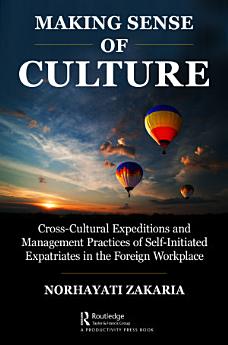Making Sense of Culture: Cross-Cultural Expeditions and Management Practices of Self-Initiated Expatriates in the Foreign Workplace
About this ebook
Indeed, the complexities of human behaviours opens up the window of opportunities to recognize that we are all human beings with unique characteristics, personality and attitudes. It is until and when we equally acknowledge that culture is an essence of humankind and that culture continues to shape people with a magical touch of diversity and uniqueness, only then will the global world greet people inclusively by embracing ‘tolerance, appreciation, and happiness!’ Culture has a paramount impact on how leaders manage their colleagues and teams in the workplace. One’s attitudes, values, beliefs and perceptions all matter when people work with culturally diverse colleagues. Cultural differences cannot be ignored as a work structure that thrives only in a monoculture environment is hardly in existence for multinational corporation of today. Instead, the multi-cultured environment takes priority with the soaring number of demands for global talents and workforces that need to be recruited. It is clearly established in the field of international human resources that there are increasing trends and phenomenon of burgeoning SIEs in newly occupied cosmopolitan cities in the world such as Dubai, Qatar, Jeddah, Kuala Lumpur, Hong Kong, Shanghai, Tokyo, and many others. At the end, one key question matters for the journey of cultural sense making to begin: What is it like to experience the forces and effects of culture in the workplace when one is an expatriate?
Ratings and reviews
- Flag inappropriate
About the author
Dr. Norhayati Zakaria is an Associate Professor at the University of Wollongong in Dubai (UOWD) and currently teaches undergraduate courses like responsible leadership, intercultural applications of socially innovative business and postgraduate courses like managerial skills and concepts. She was attached with the School of International Studies, Universiti Utara Malaysia before moving to Dubai (1996-2009). Her educational training bridges interdisciplinary fields between cross-cultural management, international business, and computer-mediated communication technology. Dr. Zakaria’s research program aims at exploring on how and why cultural values shape people differently in terms of communication styles, leadership, and management practices. In specific, she is interested to further explore on a research agenda with a key question of: what are the cross-cultural kit needed for talented human resources to build a cross-culturally-competent individuals and how do they develop culturally versatile competency and technologically savvy skills to effectively perform in the novelty virtual work structure such as global virtual teams. Her book entitled, Culture Matters: Decision Making of Global Virtual Teams marked her scholarly work in the area of research that integrates cross-cultural management and information science fields relevantly. For more than a decade, she has established international research collaborations with global scholars from the United States, Japan, Malysia, and Canada. She has secured international grants as the Principal Investigator as well as Co-Investigators from bodies like Asian Office of Aerospace Research Development, Japanese Society for the Promotion of Sciences, Nippon Foundation and National Science Foundation. Some of her selected publications are indexed by ERA, ISI or Scopus such as Academy of Management and Learning Education, International Journal of Manpower, IT & People, the Database for Advances in Information System, and Creativity and Innovation Management.




